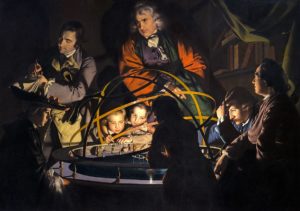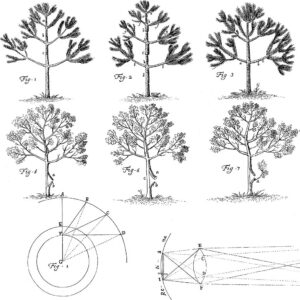 Science, then, is not an organization, and is not a proclamation from someone in a white coat, or even an army of impressive coats with impressive titles. Science is nothing but a process of isolating reliable facts.
Science, then, is not an organization, and is not a proclamation from someone in a white coat, or even an army of impressive coats with impressive titles. Science is nothing but a process of isolating reliable facts.
Bacon contrasted his way with the old way by writing this:
If a man will begin with certainties, he shall end in doubts; but if he will be content to begin with doubts he shall end in certainties.
What Bacon meant is that if you begin by assuming nothing (“with doubts”), you can test and develop solid facts. And if you do this consistently, you can be very sure about a lot of things. But if you begin by thinking that you already how things are (“with certainties”), you’ll end up with lots of doubts, because many facts won’t fit into your pattern.
A modern scientist, Richard Feynman, summarized the whole thing this way:
It doesn’t matter how beautiful your theory is, it doesn’t matter how smart you are. If it doesn’t agree with experiment, it’s wrong.
The focus of scientific and technological innovation in England was a group called the Royal Society, which stood entirely outside of that era’s educational hierarchy. It was initially formed independently and was dedicated to the “new science, as proclaimed by Francis Bacon.” It was originally formed without any real name by individual physicians and “natural philosophers,” whom we’d call “doctors and scientists.” It became “royal” only after it had been operating for some years, rather like universities were acknowledged only after they had succeeded. And it’s telling that the Society’s motto was Nullius in verba: “Take nobody’s word for it.”
The journal of the Royal Society published the newest scientific findings, and it was filled with contributions from all quarters and from all types of people. These publications were available to anyone who wanted them. An issue might contain a report from a lens grinder, a report on plant life in the Americas, archaeological notes from a newly-found Roman site, experiments on the improvements of steam engines, new mathematical techniques, a new method to remove ships that had been run ashore, and so on.
Here is a page from the Philosophical Transactions, the publication of the Royal Society, dated 1753. It is from an article entitled, Concerning the Apparent Magnitude of the Sun and Moon, or the Apparent Distance of Two Stars, when Nigh the Horizon, and When Higher Elevated:

Here are the words of Denis Diderot, who edited the first great encyclopedia during this time:
This work constantly demands more intellectual daring than is commonly found in cowardly ages. All things must be examined, debated, investigated without exception and without regard for anyone’s feelings. We must overturn the barriers that reason never erected and give back to the arts and sciences the liberty that is so precious to them. We have for quite some time needed a reasoning age when men would no longer seek the rules in ancient authors, but in nature.
Locke’s Republics
John Locke was an English philosopher who created a new justification for human liberty and a new base for the republic as a form of political organization. He did this by examining what humans were like in their “natural state.” That is, what they were like before they were herded into political groups and compelled to live as rulers demanded.
He explained this in a book called the Second Treatise on Government, published anonymously in 1689. (Locke’s name never appeared on the book during his lifetime, almost certainly because he feared for his personal safety.)
In his book Locke begins by saying that humans are naturally free of all obligations, political or otherwise, writing this:
All men are naturally in a state of perfect freedom to order their actions, and dispose of their possessions and persons as they think fit, within the bounds of the law of Nature, without asking leave or depending upon the will of any other man.
He went on the explain how such people could join together to form a government, but only through voluntary agreement. He moreover explains how they or their children could exit the agreement. Forward-thinking and oppressed people took Locke’s ideas and began applying them. In particular, they began imagining republics based upon that foundation. (These people had no interest in democracies, which had failed spectacularly in Greece.)
Republics had existed in several places, especially during and following the Renaissance, but they had stood upon Roman ideas from the era of slavery, and held too many of those assumptions. Locke gave people a way to build a republic upon the base of human liberty and choice.
And so, in the wilderness of America, a Lockean republic formed. The American founders knew Locke’s arguments very well, reciting them and praising them at length. And even though the successful American experiment of dumping the monarch was followed by a disastrous French experiment, the idea of leaving the king for a rights-protecting republic spread through the world and swept most European monarchies away over over the next century or so.
The Industrial Revolution
By the industrial revolution, we refer to Europe’s new scientific discoveries being put to use in a new organizational system. We especially mean the replacement of animal power (and even water or wind power) with chemical power. New machines were then used to manufacture far more effectively and affordable that ever could have been done previously.
The great symbol of the industrial revolution, of course, was the factory. In these new factories, coal-power steam engines made many new and attractive things possible.
To understand just how big this change was, consider this passage from historian Carol Quigley:
The political and social structure established in central Europe almost four thousand years ago was not destroyed, in spite of Rome, Christianity, and later migrations, until the appearance of industrialized urban society in the 19th century.
The Industrial Revolution was, beyond anything else, a great surprise. Its mixture of scientific discovery and unrestrained human action produced a new method of organization that was overwhelming in its ability to produce valuable goods on a never-imagined scale. The new factories made more people rich that anything that had come before, and by a very large margin.
The new machines and processes of the industrial revolution were opposed by entrenched interests. People who were enjoying advantages – especially legal advantages, like guilds and aristocrats – demanded that the new machines be outlawed. The first effective manufacturing machines, weaving looms, were often hidden in homes and used in secret. This was common in places like London over the 17th century.
Practical steam engines were widely available by 1780 and became the greatest power source in the history of the world. Huge amounts of power could now be produced and distributed, easily and efficiently. Systems of belts, drive shafts, gears and pulleys could distribute this power a building with a single engine. And so factories became a practical possibility, and people soon figured out how to use them well.
It was soon enough understood that whoever embraced the steam engine and the new possibilities it brought might become very rich. At that point legal challenges faded away.
In factories, for the first time, large numbers of people could work in a coordinated way.
Working alone and by hand, a skilled worker could make a piece of furniture with perhaps forty hours of work. But if a factory was set up to produce that same item, it could be produced with perhaps five hours of labor, an eight-fold increase in efficiency.
Setting up a factory full of specialty work-stations, however, was expensive. It required engineers, machine builders and installers, not to mention the necessary materials and tools. But once the money was invested, and once the investment was recovered, very large profits followed. And factory-made items were very, very popular: People were eager to pay one fourth the price for the same product. (Furniture, clothing, household furnishings, household machines and so on.)
Soon, factories were sprouting in and around cities, where there were clusters of skilled people, supply facilities (ports, railroad stations, etc.) schools and workers. First in England, then in the United States and in Europe, a new, urban culture began. Young people left the countryside for well-paying jobs in the city. And so the rural culture began falling apart, or at least changing. This was a major and unexpected change, making some things better and some things worse. But the opportunity for families to live far more comfortably was something that couldn’t be stopped.
Over the next century, wave after wave of people came to the cities for jobs, and a new set of institutions formed: local banks, meeting halls, merchants’ associations, warehouses, barge terminals and railway terminals. Mutual assistance organizations formed, churches sprang up to service the new arrivals, along with restaurants, barbershops, newspapers, grocery stores, hardware stores, and many others. The world took its modern form.
At the same time, industrialism displaced the royal families of Europe. Their power had been huge and their methods of influence were many, but they were nonetheless pushed out. The new system removed the ground from beneath their feet.
Soon enough, people began seeing the world differently and began demanding some say in how they were ruled. Americans, followed by Europeans, demanded republics, in which they played a role. And so governments were forced into the popularity business. They struggled to determine what the masses wanted, what they were afraid of, what made them like someone and what made them dislike someone.
In some ways, turning rulership into a popularity contest was beneficial, since it made the politician dependent upon the populace. In measure, at least, the politician listened to the voters, and did what they wanted him or her to do. But on the other hand, politics became a manipulation contest, and politicians hired specialists to help them do it.
**
Paul Rosenberg
freemansperspective.com
